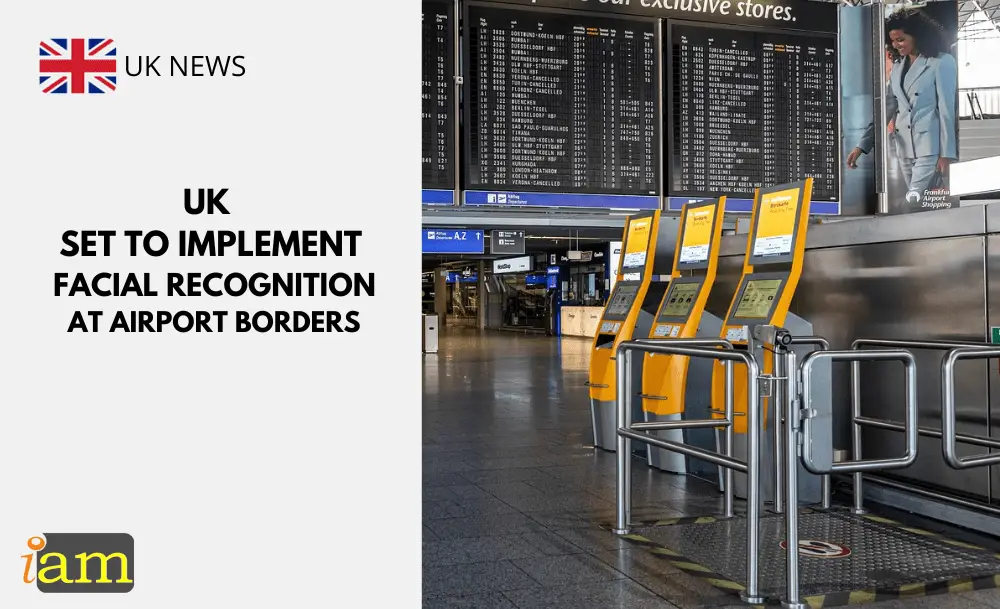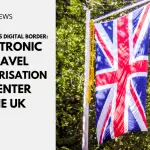UK Set to Implement Facial Recognition at Airport Borders

In a move aimed at revolutionising border control, the UK is on the brink of adopting facial recognition technology to potentially replace traditional passport checks at airport e-gates.
This transformative shift, proposed by the government's borders agency, seeks to streamline and enhance the travel experience for incoming passengers.
Phil Douglas, the director general of the Border Force, expressed admiration for existing e-gate schemes in countries like Australia and Dubai. He highlighted the convenience of using electronic travel authorisation and smartphones to transmit passport chip images ahead of arrival, eliminating the need to physically present the document upon entry. Embracing a similar concept, the UK aims to create an “intelligent border” that leverages frictionless facial recognition technology.
Trials at airports are expected to begin this year, marking the first step towards potentially widespread implementation. If the proposal is approved, a procurement process will be launched to distribute the necessary hardware across the country.-
Douglas has emphasised the potential advantages of biometrics and data security in managing the UK's borders. He foresees a future where passports become largely redundant, replaced by biometric data.
While acknowledging potential reservations among the public and policymakers about moving away from traditional passport checks, Douglas envisions a border system where comprehensive information about travellers, including previous UK visits, immigration compliance, and security records, is readily available. This data-driven approach aims to facilitate smoother entry for compliant individuals while potentially restricting access for those flagged by security systems.
How It Works
The proposed system builds upon existing e-gate technology, aiming to transition from a combination of passport data and facial recognition to solely relying on facial recognition. This shift could significantly reduce entry procedure times, potentially reaching as low as five seconds per passenger, as seen in Dubai. However, limitations exist, with certain demographics, such as families with young children and individuals below a specific height, currently excluded from accessing this technology.
Currently, the UK's 270 E-gates are accessible to specific nationalities and age groups, including British citizens, EU nationals, and citizens from Canada, Australia, New Zealand, Singapore and South Korea.
E-gates use a combination of passport data and facial recognition, which means that travellers must have their physical travel document on hand when using the gates for data encrypted on the document to be matched to the traveller. This can cause delays because travellers must correctly set their document on a reader, keep it in place, gaze at a camera, remove any spectacles, and so on.
The new system will only need facial recognition to identify the passenger through a centralised database based on the Electronic Travel Authorisation (ETA) scheme. People will need to be registered on a database before they can simply walk in and out of an airport.
As the UK moves toward this futuristic border control paradigm, the practicality of its widespread implementation remains a topic of discussion.
The integration of facial recognition at UK airport e-gates marks a significant leap toward a seamless and technologically-driven border control system. While promising in enhancing efficiency and security, its ultimate implementation and acceptance on a broader scale hinges on addressing logistical, financial, and ethical considerations, ensuring a balance between innovation and privacy concerns in the realm of international travel.
Are you excited to travel without your passport? Talk to us in the comment section below. Or if you need more advice on the above, contact us for further travel & immigration advice.
Check out the deals we have found below and tell us your travel plans.
Check out the offers and discounts from:
And because of the pandemic, don’t forget to get your travel insurance, which will cover you for flight disruptions and pandemic related matters.
IaM can help with your visa application to Europe, the United States, the UK & other countries
If you need help with a US visa, a UK Visa, or a visa to Europe, including help with appointment booking obligations, IaM can help. For more information and advice on US immigration, UK immigration law and US visa applications or if you need any help or assistance please, reach out to your Visa Coordinator at IaM.
Some of our posts include affiliate links. If you choose to purchase any of these products, we might get a small commission. For more information, check out our TOS.
- UK Replaces Visa Stickers with eVisas: What International Students Must Know - 13 July 2025
- UK Youth Mobility Scheme 2025: Second Ballot Opens 15 July - 11 July 2025
- UK Set to Relax Airport Liquid Rules at Some Airports - 10 July 2025











